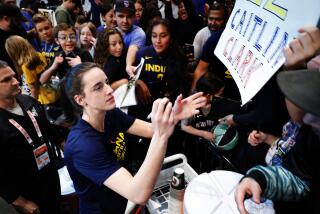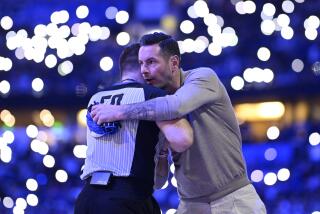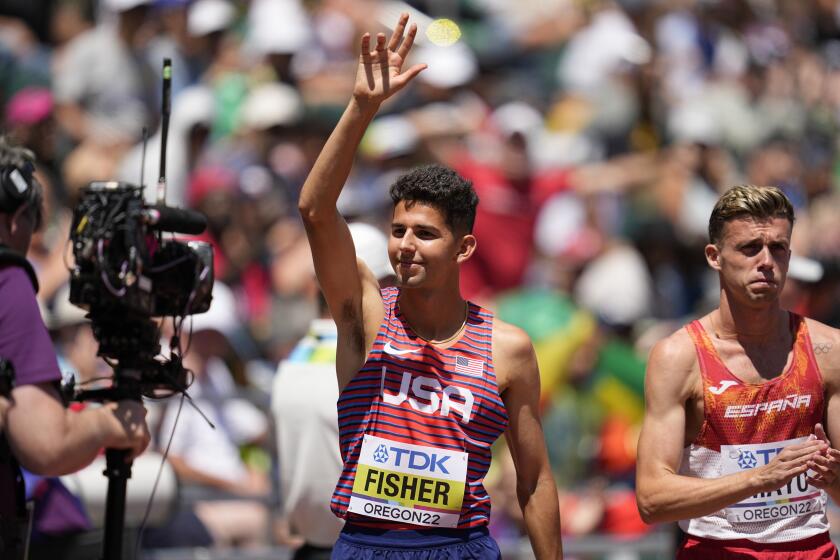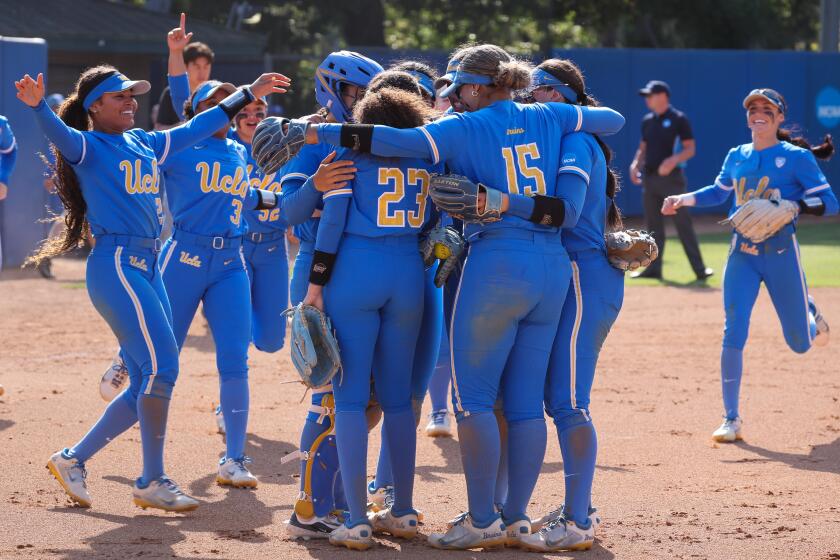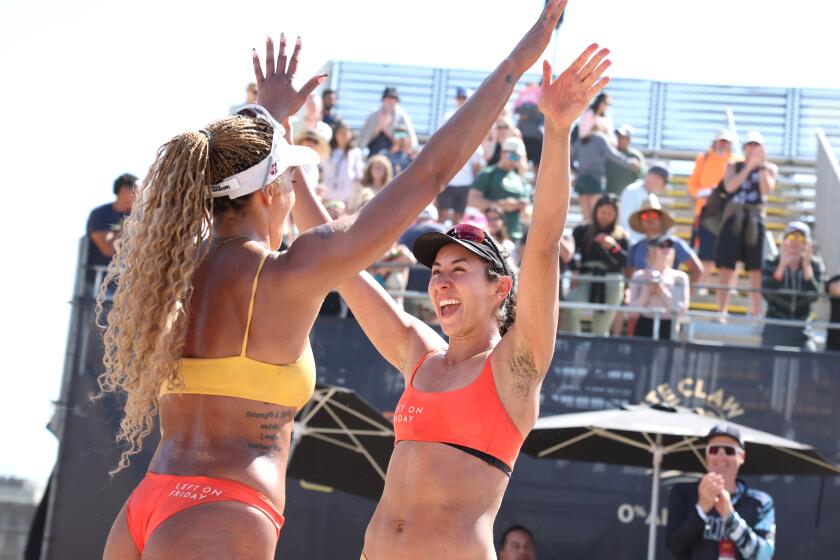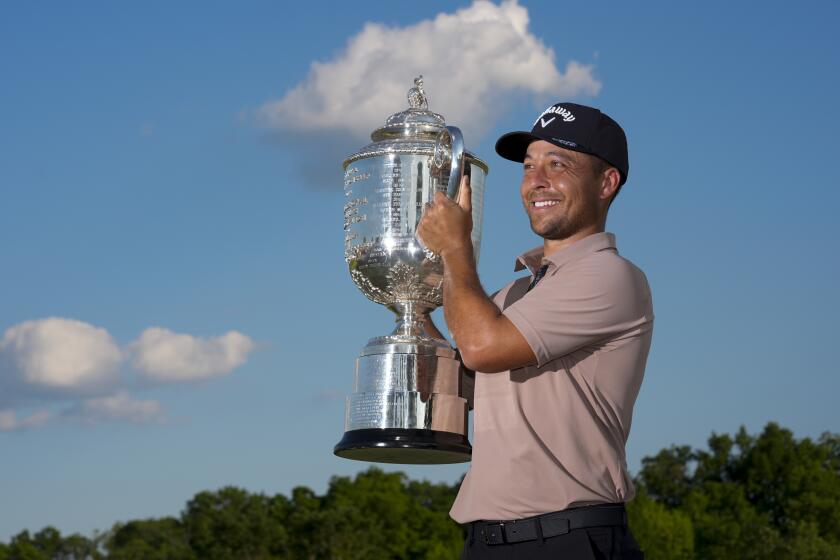Promising Pitching Career Fades to Black : Baseball: Former Southern California College standout tried everything he could to make the pros.
Any baseball fan who has marveled at the million-dollar salaries of seemingly mediocre major league pitchers has probably thought, “Hey, I could do that .”
Think again.
David Black is flesh-and-breaking-ball proof that it’s not so easy.
Black is an average guy with above-average talent and persistence that’s off the charts. He was a dominant right-handed pitcher for Southern California College, posting the lowest earned-run average in the NAIA District 3 in his final season, and believed he would move on to the next level.
“I expected to be drafted,” he said, “because a lot of people around me were saying, ‘You’re going to go,’ ‘I hope you go,’ ‘You should go,’ ‘If you don’t go, there’s something wrong with the system.’ ”
On draft day 1992, the system snubbed Black for the first time.
Major league baseball selected about 1,400 players in the 1992 amateur draft. Most signed professional contracts and reported to minor league teams. Some of those who were not drafted signed free-agent contracts.
Black had neither option.
Scouts said he was too short (5 feet 9 1/2 inches) and that his mid-to-low 80-m.p.h. fastballs were too slow--basically, that he wasn’t a good prospect.
Black, a 24-year-old graduate of El Modena High who also pitched at The Master’s and Orange Coast colleges, was unconvinced. He had proved in his college career that he could be an effective pitcher. If he could get batters out, who would care that he didn’t have a 90-m.p.h. fastball?
So after touring Asia, Alaska and Canada with an Athletes In Action team during the summer of ‘92, Black decided to sell himself.
He went about it much like someone would for any job search. He compiled a resume and shipped it out to about 100 minor league teams. He visited representatives of potential employers, going to as many tryouts as possible.
The odyssey lasted nearly a year and took him from Mexicali, Mexico, to Chillicothe, Ohio, and numerous places between, seeking a team that would give him a chance. He received plenty of counsel from scouts: rejections, brush-offs and misleading advice.
Some told him one thing, some another.
“You find two groups of people who you can respect,” he said. “One says that they can’t use you but they appreciate your effort and the final one--I’ve only had one--that basically said, ‘You don’t got it, give it up.’ ”
Despite that harsh assessment, Black, fueled by a boundless optimism he credits to his Christian faith, continued his single-minded pursuit. He supported himself as a waiter, taking occasional jobs helping a friend install cabinets and giving Little Leaguers pitching lessons.
Until very recently, he was still trying.
The quest ended June 19 in Chillicothe, in a hotel conference room where the Frontier League, a new independent rookie league, held a draft after a two-day tryout.
Black waited more than four hours for his name to be announced. It was a fruitless wait. Of 47 pitchers at the camp, 22 were drafted.
“The people who threw before me and after me got drafted and I was left in the middle, left out,” Black said.
He had expected more this time. His tryout had gone well, he thought. Scouts and coaches for the eight teams had seen him at his best.
Black was happy for a couple of former SCC teammates who were drafted--catcher Matt Dahlgren by the West Virginia Coal Sox and pitcher Matt Imus by the Tri-State Tomahawks--but he was hit hard by the realization that his professional baseball career was over before it started.
“I was depressed about it,” he said. “It wasn’t easy to take knowing that it was my last shot.”
No one is forcing Black to quit. He is single; his family is supportive. But Black decided that this trip east--he also went to a walk-on tryout for the USA baseball team in Millington, Tenn., and another new minor league in Minneapolis--would be his last attempt.
“There’s a burning-out process and I’ve decided this would be the last go,” he said. It was a long journey to get to this point. The quest started in earnest last fall when Black drove all night from Orange County to Mexicali. He had been told that playing in Mexico might be a back-door to the minor leagues, but he wasn’t given a tryout in Mexicali.
He stayed in the border city for several days, sleeping in a homeless shelter, while trying to line up another opportunity in Mexico. He thought he had one, in Guadalajara, but discovered just before he was going to buy a plane ticket that the league in Guadalajara doesn’t permit American players.
Back at home in Costa Mesa, Black continued to work out at SCC. He also pitched in scout league games in Los Angeles on weekends and got a chance to pitch for a team of minor leaguers under contract to the Toronto Blue Jays.
John Cole, a Blue Jay scout who helped run the team, said he was happy to give Black and a few other unsigned players a chance to get into the action, but that they all were told the chances of signing with the Blue Jays were slim.
Black, who entered games after all the pitchers who were under contract, said he had never faced such tough hitters. But he adjusted and said he was never knocked out of the game.
“I gave up hits but I didn’t give up runs,” he said. “They would hit me but I would always get ground balls again.”
Cole, who also had seen Black pitch in college, said he was impressed with Black’s effort and determination, but said that he doubted he would get any better.
“It’s less how they do and more how we think they’ll do later,” Cole said.
Still Black persevered. Told that he would have a good chance to make a minor league squad by going to Arizona, near the end of baseball’s spring training, Black gave it a shot.
He got in touch with Bob Lacey, who pitched for the Oakland Athletics for nine years.
“I tried to discourage him because of the timing,” Lacey said. “It was mid-March and teams have already set their rosters by then. Whoever told him he could still try out was crazy.”
After hearing Black’s story, however, Lacey agreed to make a few phone calls to friends in hiring positions and was able to arrange tryouts with the A’s and the Cubs. Black also was able to talk with some Brewer officials.
All the answers were basically the same. It was too late to be considered. But Black was told about two rookie leagues that were starting this season.
So he decided to make a final attempt at a dream. The USA baseball team was having a walk-on tryout about the same time tryouts for the two leagues were to be held.
It didn’t work out. But Black says he’s at peace.
“This is my last hurrah,” he said. “I’ve been at it for a long time and I feel that after this, if it’s not going to happen, I am totally satisfied with my effort and I know that I have given it my all.”
More to Read
Get our high school sports newsletter
Prep Rally is devoted to the SoCal high school sports experience, bringing you scores, stories and a behind-the-scenes look at what makes prep sports so popular.
You may occasionally receive promotional content from the Los Angeles Times.

